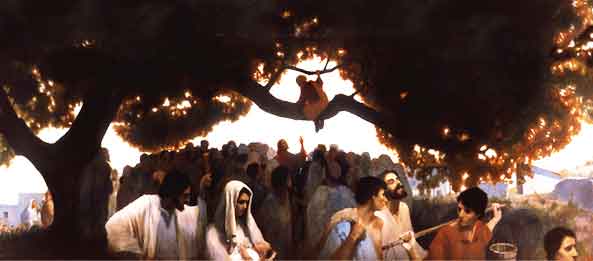
Only Luke tells the story of Zacchaeus, a man of small stature whose story of radically turning around repentance challenges notions of family, faith and participation in the unfolding word of God. While ancient it continues to speak to our context, challenges and identity as followers of the Way of Jesus today.
These three episodes wrapped in the story of maybe the most famous small man in history are intertwined with the journey of we are going up to Jerusalem. This statement gives a geographical marker for these stories, and also a clue to the narrative progressive of Jesus’ spiritual journey towards the radical cost of following his teachings: the cross. Jericho was the last town of significance before one left the Jordan Valley to make the ascent to Jerusalem. Jerusalem is also the end game destination of Jesus’ journey, and specifically the narrative journey we have taken reading through the gospel of Luke during the 6 weeks of Lent, to which Jesus points in Luke 9:51 and discusses with the prophets Elijah and Moses in Luke 9:31. It’s there that Jesus will be mocked, judged, flogged and crucified: killed to silence the radical dissent and revolutionary religious zeal he inspires in his word, actions and relationships.
The encounter with the blind beggar, who alone seems to sees Jesus for who is truly is – both a faithful member of the community (a son of David) and a radical leader coming to bring geo-political revolution and religious reformation. It’s for this that he will be killed by the Roman authorities for treason at the bequest of the Jewish Religious Leadership threatened by his “heretical” rocking of the establishment. Zacchaeus as a chief tax collector is the perfect representation of the establishment: the swamp Jesus comes not to drain but rather to create by transforming “the haunt of jackals into a swamp, … called the Holy Way” Isaiah 35:7-8. He is complicit in a system that profits from the suffering of people, building a wall among a community intended to be a family. Something in and from Jesus changes him, disrupts his complicity, melts his prerogatives, opens “his eyes” to see who and how he is and both what he could be(come) and what God created him to be. Jesus delivers him, reminding him – and everyone else – that they, together, are all children of Abraham, beloved of God.
Questions for the practice of Examen & Contemplation
- What strikes you in this passage ? How does it interact with what you’re living these days, or thinking about? While blind, the talkative beggar seems to see Jesus.
- How do you see Jesus these days…. How do you experience faith as a invitation to a new sense of family?; a belonging that is tied in with our salvation and well-being? What is the connection for you between personal faith and communal belonging?
- How do you experience faith as a invitation to a new sense of family?; a belonging that is tied in with our salvation and well-being? What is the connection for you between personal faith and communal belonging? How is God calling you – us – to be a community of the lost making room for the lost? How does that give you hope? How is that revolutionary in our bubble and wall divided post-election society?
Download a tool to study the text of today’s story HERE.